
You’ve made your way through the sometimes confusing process of applying for subsidised home care services and have been approved for a Home Care Package (HCP) or Commonwealth Home Support Services. Or perhaps you obtained approval for subsidised services for a loved one. The next step is to find the provider who’s right for you or your family member.
Because home care is consumer-directed, which means you can choose any provider you prefer, you have a lot of choice – but that choice itself can also be overwhelming. In 2019, there were nearly 1,000 different providers approved to offer home care services, and more are approved regularly. With so many options, how do you find the right provider?
The first step in choosing the right provider is to create a list of providers in your area who offer the services you need. Your initial criteria can be broad; you need a provider who offers services in the region where you live and you need a provider who offers all the services you’re approved for in your HCP.
You can search for providers who are approved for HPCs through the My Aged Care database. Every provider in this list is approved to offer HCP services and all of them should be compliant with the Aged Care Quality Standards. To search the database, just choose your location, the type of care you need and the services you’re looking for.
However, searching with only those basic priorities in mind could give you an unmanageably long list. For example, a search for Level 2 HCP providers in North Perth currently gives 72 results. Researching each provider to find the best one for you would be time-consuming. To create a manageable list, you’ll need to be more specific about what you want for your care.
Fortunately, the MyAgedCare provider search function allows you to add more details about your priorities. Perhaps you want a provider who will understand and respect your cultural background or need a provider who specialises in care for your particular condition or situation. The database search includes options for specialisations, language and faith preference.
When you add these optional filters, they won’t remove any providers from your results list; you’ll still see every provider in your area who offers the type of care and services you need. However, the filters will change the order of the results in your list. This is important to know – the providers listed first are the ones that most closely match your preferences.
Once you’ve decided what your priorities are for your care, you can begin to create a list of providers you want to consider. It’s a good idea to create a shortlist of three to five providers who can provide all the services you need and who you think will probably be a good fit. Once you have your shortlist, you’ll interview each of them to make your final choice.
Begin this shortlisting process by clicking the ‘compare’ button to the right of a provider that interests you to add that provider to your comparison chart. You can add three providers at a time. The chart enables you to easily view side-by-side comparisons of the providers’ quality, specialisations and prices.
Below is a step-by-step example of how you can use the provider search tool to create your shortlist. For full disclosure, home care in Perth is a topic I know very well because I’m the co-founder and CEO of The Careside, which provides home care in Western Australia.
Go to the MyAgedCare find-a-provider search tool. Set the broad criteria for your search. In this example, we’ll search in North Perth 6006 for providers who offer Level 2 HCP services.
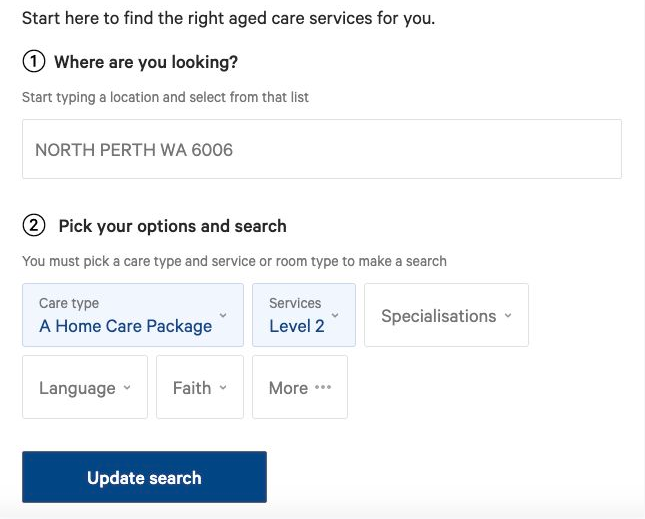
Use the dropdown boxes to select your optional priorities. For this search, we’ll look for providers who specialise in veterans, people living in rural or remote areas and offer cultural and linguistic diversity. This search will also specify Mandarin language and Buddhist faith.
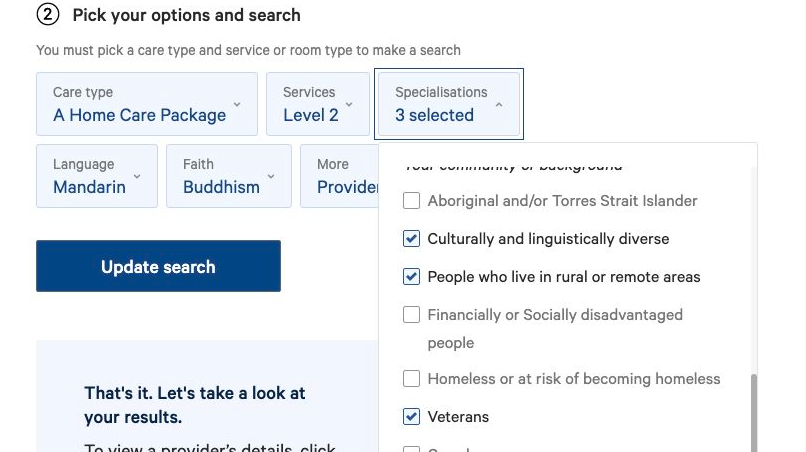
Click ‘update search’ and view the listed results. There are 72 providers listed. This includes all the providers in the specified region who can offer Level 2 HCP support. The providers first in the list are the ones that most closely match the additional filters selected.
By selecting the ‘more’ button, you can further narrow your search by choosing only providers that have capacity to offer services at the current time of your search and those that permit self-managed or self-directed HCPs.
Decide which providers to add to your comparison chart, and click the ‘compare’ button to the right of each provider. Since the list shows the closest matches first, it makes sense to start with the top three results, which in this specific example are Better Living Homecare, Happy Living, and Enrich Living Services.
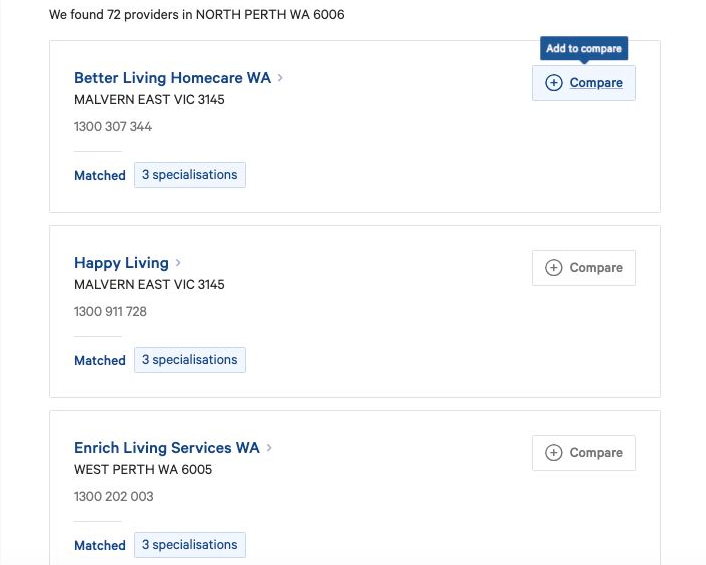
The maximum number you can compare at once is three, so once you’ve selected three, select ‘view comparison’ in the banner at the top of the screen, which will take you to a comparison chart.
The first section of the comparison chart compares by quality. All the providers in the MyAgedCare database are required to meet the Aged Care Quality Standards, but they are not automatically removed when there is a complaint of non-compliance. In this example, you can see there are current or past notices of non-compliance for Better Living Homecare.

If there were current or past notices of non-compliance or sanctions, however, you can find more details about them by clicking on the name of the provider at the top of the chart and then on the ‘compliance’ tab on the provider page. This will show you which standards the provider is not meeting, as well as information about the status and outcome of the provider’s attempt to meet standards.
In this case, the page shows the provider has failed to comply with several standards. It also shows the status of the non-compliance is active and the outcome has not been determined. This means the provider is currently attempting to meet standards, but they may not be meeting the standards for quality care at this time.
This article isn’t an attempt to single out any particular provider but to demonstrate the importance of understanding how MyAgedCare’s find-a-provider search function can be used to narrow down what’s a large field of contenders. In my opinion, though, non-compliance with quality standards can be a strong reason to remove a provider from your shortlist. You can remove a provider from your comparison chart by clicking the X next to the provider name at the top of the chart.
Removing a provider from your comparison chart enables you to add a different provider to compare.
Go back to your search results and add the next provider in the list. That provider should be the next closest match to your priority filter settings. In this search, the next provider on the list is Catholic Homes Home Care.
Return to the comparison chart and compare the three providers results in the ‘quality’ section. All of these providers are meeting standards, so you can move on to compare the next section.
The second section of the comparison chart is ‘culture’. Since all of these providers are high matches for your search for cultural and linguistic diversity, all of them provide services in a variety of languages and for a variety of cultures. This comparison indicates all three of these providers would be a good fit, so you could keep them all on your shortlist.

The next two sections of the comparison chart are ‘specialisations’ and ‘Home Care Package support’. The specialisations section lists the specialised services each provider offers. In our example, all three providers offer similar options.
In the same way, the HCP support section lists the levels of package that each provider supports, and since the search includes that, all of these providers offer Level 2 support. Both of these sections indicate three providers could be a good match and so all three providers stay on the list.
The next section shows the basic daily fee for each provider. This fee is optional – some providers don’t charge it. Those that do charge a basic daily fee, which is a maximum amount set by the government as a percentage of the basic Age Pension, typically put aside the money in case you need services that are in excess of the HCP subsidy you’ve been allotted. Money accrued in this way can be transferred to another HCP services provider should you change providers in the future.
In this comparison, only Enrich Living Services charges a basic daily fee.

Since there are two promising providers that don’t charge the basic daily fee, there’s no advantage to keeping Enrich Living Services on your shortlist. Click the X to remove it from the chart.
Return to the search results to find the next provider on the list. In this case, the next closest match is The CareSide, so click the button to add it to the comparison chart. Then look again at the first several sections of the comparison chart to make sure the new provider you’ve added meets your criteria. The CareSide meets all quality standards and offers the services and specialisations required, so now you can focus your comparison on price.
The next section, care management, compares administrative fees for fully managed or self-managed care. In this comparison, only Catholic Homes Home Care charges a management fee; both Happy Living and The CareSide offer fully managed care at no additional charge. This could be a reason to remove Catholic Homes Home Care from the comparison chart.

Go back to the search results and add the next provider, Carealot Home Health Services, to the comparison chart.
Look through each section again to compare the new provider. In this case, all three providers now meet quality standards, offer the services required and charge no basic daily fee. Although Carealot does charge an administrative fee for fully managed care, its fee is smaller and seems more comparable to the other two providers in the chart.
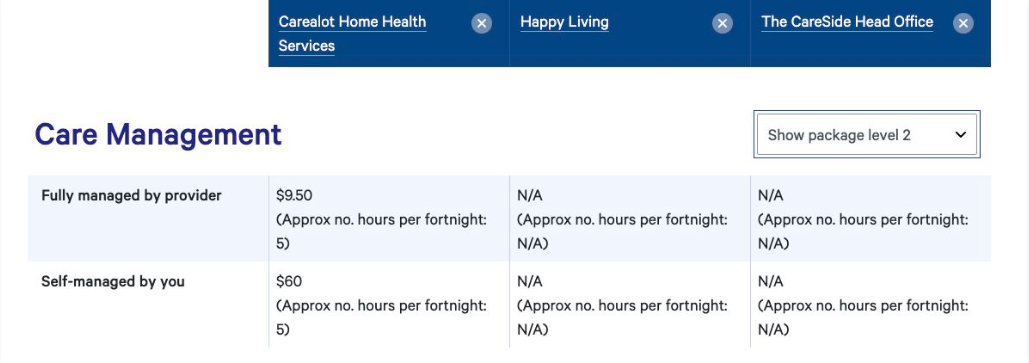
Your next step is to compare the three providers ‘price for common services”. These can vary, and you may need a service that’s not on the chart. The most important thing to consider is whether the prices fall in the same approximate range. If one provider’s prices are significantly higher than the others, then you may want to remove them from your list. In this case, the range of prices is similar for all three.
Also compare the providers ‘other costs’. This is an important section because many providers charge significant unexpected fees. Although Carealot Home Health charges an exit fee, which Happy Living and The CareSide do not charge, the three providers are comparable in these charges, and all of them can probably stay on the shortlist.
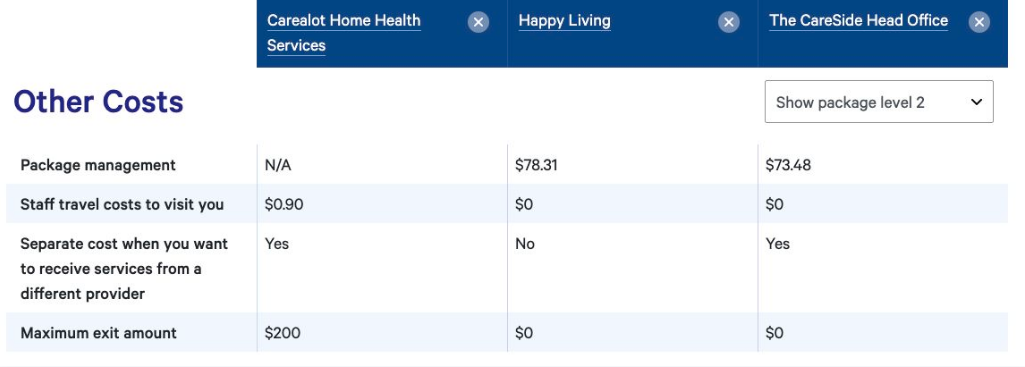
Now, you can finalise the shortlist. The shortlist of providers for this search includes Carealot Home Health, Happy Living and The CareSide. All three of these providers offer Level 2 Home Care Package services, are a good match for the specialisations desired and have similar prices. These three providers could be considered in the next stage of the process.
The MyAgedCare comparison chart is just one way to build a shortlist. It’s also helpful to seek advice from people you trust. For example, your primary doctor might suggest a specific provider. You may have a friend or neighbour who uses home care services; asking about their experiences can be a good way to add recommendations to your shortlist.
However, keep in mind that your needs may be different from your neighbour’s, and a provider that your doctor admired five years ago may have changed management since then. If a provider is recommended to you, find them in the MyAgedCare database and check their quality compliance page to make sure they are currently meeting standards of care.
It’s also a good idea to use the comparison chart to compare a recommended provider’s prices to similar providers. Your neighbour may be happy with his or her carer, but may not know that they’re paying 10 per cent more per hour than necessary — money that he could be using for additional services or more hours of care.
Finally, make sure your shortlist is, in fact, short! It should only include providers who are likely to be a good fit for you. It should be few enough that you can easily call and interview each of them. Two or three providers are sufficient; five is the most you need.
Once you’ve narrowed down your list, it’s time to pick up the phone. Talking with providers will give you more detailed information about their carers, their processes, and their prices.
Think about what’s most important to you. Is your top priority to spend wisely and make sure your HCP dollars cover as many hours of care as possible? Ask detailed questions about their pricing structure and make sure you uncover any fees that may not be clearly listed.
Is scheduling and convenience your main concern? Ask for more information about carer schedule and availability and find a provider who guarantees that carers will arrive at a specific time instead within a window of time.
Make a list of questions you want to ask, then call every provider on your shortlist and ask the same questions of each one. If you have a lot of questions, it’s a good idea to schedule a time to talk with someone who can answer questions about their home care services. But don’t worry about taking too much time – keep asking questions until you’re satisfied. Remember, the consumer-directed system means you have a choice about your provider. You deserve to make an informed decision.
If you haven’t spoken to a home care provider before, you might be concerned you’re going to miss a vital detail, so here’s a list of sensible questions you could ask each one you speak to.
Questions about cost
Questions about schedule
Questions about additional needs
Questions about quality
Take notes during your conversation with each provider so you can easily compare how they differ. You may also want to ask a friend or family member to come with you for these conversations to help take notes and remember the questions you want to ask.
After you’ve talked with each of the providers on your shortlist, it’s time to make a decision. Look at your notes from each interview to compare each provider’s response against the others on the topics that matter most to you. You may want to make a list of the things you like and dislike most about each provider. Or, after talking with all three providers, you may feel confident from the tone of the conversations that one of them is the best fit.
Keep in mind that you don’t need to put too much pressure on this decision; you can always transfer providers if you change your mind. Your decision isn’t final. The important thing is that you make an informed decision and recognise that you have control over getting the care you want and need.
Once you’ve chosen your provider, you can set the start date. First agree on the date with your provider, then login to your My Gov account to get your Aged Care referral code. Your referral code is how you pay for care; simply give your code to your chosen provider and they’ll invoice for service through your HCP funds.
Finding a home care provider can feel complicated, but it doesn’t need to be. This guide includes steps you can take, but you don’t have to use this entire process. Even if you only spend a few minutes researching potential providers, the information you gain will help you make better decisions about your care.
And if you’re struggling to find the right provider, don’t hesitate to get help. If you don’t have a friend or relative who can help you, contact the Older Persons Advocacy Network at 1800 237 981. Through their website, you can request a free advocate who will help you identify your priorities, understand your options and navigate the system to find the best home care provider for you.
Consumer-directed care shouldn’t be overwhelming; it should be empowering. The purpose of provider options isn’t to overwhelm you with choice but to ensure you receive quality care. Finding the right provider is an important step toward getting care that meets your needs, respects your rights, and empowers you to enjoy life as you age.
This article originally appeared on The CareSide.